- GET CORRECTLY DIAGNOSED NOW - WORLD CLASS EMG TESTING
- 312-877-0035
EMG is Best Test to Diagnose Pinched Nerves
Best Test for Pinched Nerves is the EMG/NCV Nerve Test
Exams and Tests for Pinched Nerve Symptoms
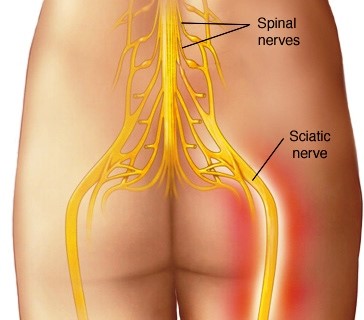
How Your Doctor Properly Diagnoses Pinched Nerves
To diagnose Pinched Nerves correctly and develop a list of possible causes, an EMG/NCV (Electromyography/Nerve Conduction Velocity Study) is the most accurate and correct test and is required.
The EMG Test measures:
1) Your nerves speed
2) Amount of electricity moving through the nerve
3) Reaction time of the nerve to stimulus
4) Overall pattern of peripheral nervous system function
What Causes Nerve Irritation, Inflammation or Compression?
• Frequent compression such as sitting on hard surfaces. Piriformis syndrome is one such compression neuropathy. This can also occur with excessive extension of the gluteal muscles under a heavy load (heavy weight lifting) . Prolonged standing on hard floors can cause the muscle to contract for prolonged periods of time leading to spasm and constant contraction of the muscle even at rest. Such is often seen in standing manufacturing jobs
• Frequent flexion/extension or rotational movements of any joint, especially under a load. This is commonly seen in baseball shoulder movements.
• Frequent exposure of the nerve to cold, heat or vibration. (Jack Hammer or Nail Air gun Use)
• Trauma or occupational overuse.
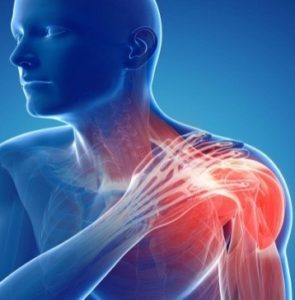 Your doctor may order a 3T (Tesla) MRI to observe the anatomical structures and to visually look for obstructions to nerve flow, called a pinched nerves or an impingement syndrome in your neck, back, shoulder, leg, foot, hand that may be causing your symptoms of numbness, tingling weakness or cold or heat sensation. However it may not show minor nerve compression that often may be the cause of your symptoms.
Your doctor may order a 3T (Tesla) MRI to observe the anatomical structures and to visually look for obstructions to nerve flow, called a pinched nerves or an impingement syndrome in your neck, back, shoulder, leg, foot, hand that may be causing your symptoms of numbness, tingling weakness or cold or heat sensation. However it may not show minor nerve compression that often may be the cause of your symptoms.
That is why the EMG test is so very valuable. Imaging studies DO NOT take the Place of Information discovered during an EMG Test. Together, these various exams and tests, the EMG Test being the most specific and accurate test, will give your doctor a more complete picture of where your nerve is pinched and confirm are of dysfunction, inflammation and compression. Using this information, he or she will be able to make the best, accurate diagnosis of the underlying cause of your hand/wrist/forearm pain.
The test can be ordered after 1 month of symptoms of numbness, tingling, weakness in the hand/wrist/forearm where the symptoms are moderate to severe or persistent referred pain from the neck or forearm to hand is in your overall history with no relief from other therapies. Additionally this test can be ordered if the hand, arm, leg or foot numbness, tingling or weakness persists greater than 3 months with no relief from other therapies.
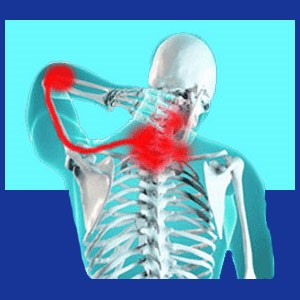
EVEN IF YOU HAVE ONLY MINOR SYMPTOMS. Persistent inflammation, compression or chaffing creates scar tissue which only make the condition worse so Early diagnosis is important.
In the physical exam and neurological exam your doctor will observe any swelling, limitation in movement, any movement that causes you pain and your symptom pattern, test your reflexes, muscle strength, and other nerve changes.
Frequent symptoms of "Pinched Nerves" are:
- Numbness/Tingling in the fingers, hand or foot.
- Shooting, burning pain from the hip or neck into the leg or hand/ wrist.
- Hand activity increases pain in the hand/wrist.
- Hands feel cold frequently.
- Swelling of the hand, fingers, foot or toes.
- Hand, foot, leg arm weakness
- Muscles feel tired or slow to respond during or after use.
- Shooting pain down into the extremities.
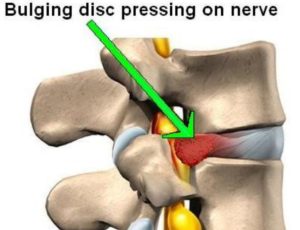
Double Crush Nerve Injury Symptoms are Common Due to Our Work/Life Stresses
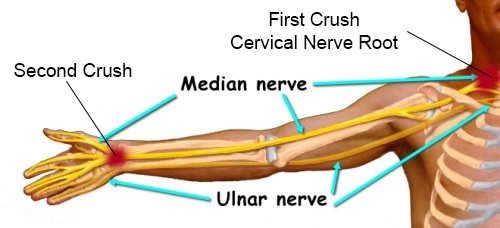
The Median nerve is formed from the C5,C6,C8, T1 nerve roots. Ulnar nerve is formed from the C8,T1 and the Radial nerve C5 to T1 nerve roots. Nerve roots are not "solitary" structures but are part of the body's entire nervous system capable of transmitting pain and sensation from the hand/forearm and directing motor movements. It is important to determine if pinched nerve roots may be contributing to your symptoms.
“Radiculopathy”, a pinching of the lateral nerve root that exits the spine through a side canal can occur when compression of a nerve root from a disc rupture (herniated disc) or bone spur (osteophyte) occurs in the spine as this nerve leaves the cervical spinal canal and travels through the lateral neck region to become the median nerve.
Muscle Spasm Related Neuropathies
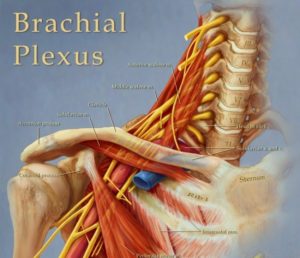 This can also occur when anterior neck muscles, called the scalene muscles are in spasm, it is through these muscles that the brachial plexus, artery and vein pass.
This can also occur when anterior neck muscles, called the scalene muscles are in spasm, it is through these muscles that the brachial plexus, artery and vein pass.
Any compression in this region can cause neurological symptoms such as numbness, tingling and weakness in the hands/arm or vascular symptoms such as hot, cold or heavy feeling or slow to respond hands/fingers because of decreased blood flow and decreased oxygen delivered to the distal extremities.
Do not wait too long after you notice regular symptoms to schedule your EMG Test, you are prolonging your condition, delaying correct and accurate diagnosis and allowing scar tissue to build up. If you have an undiagnosed compression syndrome further trauma to the nerve can cause more permanent disability if the nerve compression goes undiagnosed and excessive scarring develops.
GET RELIEF FROM PINCHED NERVES NOW
(312) 877-0035
Fast & Convenient
Expert EMG Neurological Diagnostic Tests - Same Day Testing Available! We ALSO Document work & Personal Injuries for legal cases as well. We have FOUR locations to serve you.
